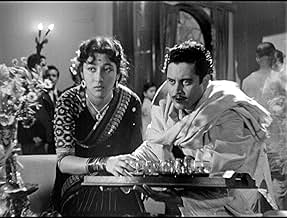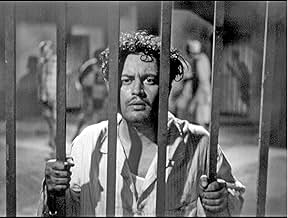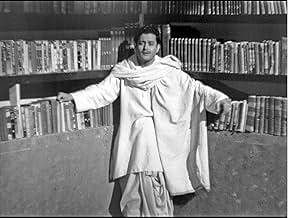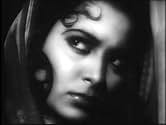IMDb रेटिंग
8.3/10
7.8 हज़ार
आपकी रेटिंग
एक कवि विजय, अपने काम को प्रकाशित करने के लिए संघर्ष करता है. हालांकि गुलाबो नामक एक महिला उसका साथ देती है जिसे उससे और उसके काम से प्यार हो गया है.एक कवि विजय, अपने काम को प्रकाशित करने के लिए संघर्ष करता है. हालांकि गुलाबो नामक एक महिला उसका साथ देती है जिसे उससे और उसके काम से प्यार हो गया है.एक कवि विजय, अपने काम को प्रकाशित करने के लिए संघर्ष करता है. हालांकि गुलाबो नामक एक महिला उसका साथ देती है जिसे उससे और उसके काम से प्यार हो गया है.
Rehman Khan
- Ghosh
- (as Rehman)
Leela Mishra
- Vijay's Mother
- (as Leela Misra)
Moni Chatterjee
- Chatterjee
- (as Moni Chatterji)
फ़ीचर्ड समीक्षाएं
If you are not familiar with the history of Hindi films and are led by the high ratings here to expect a big masala movie indicative of contemporary Bollywood films, you may come away from this film scratching your head and wondering where the high ratings came from--particularly if you are new to Hindi cinema ( as opposed to " Bollywood").HOWEVER, having said that, let me encourage those who are unfamiliar with what is known as the "Golden Age" of Hindi cinema and the historical times that gave birth to this film to do some reading and THEN watch it. 1951 was only 4 years after partition, but unfortunately, many Indians were already becoming disenchanted with the new government's ability, or lack thereof, to bring about the sweeping changes many had hoped would come with the new beginning for the new country. Pyassa came at a time of disenchantment and soul-searching as the new socialist, secular India struggled to find her footing. (Author Tejaswini Ganti does an excellent job illuminating this very different yet important time in Hindi Cinema.) It presents a very bleak picture of greed and corruption, and yet there is a small beacon of hope for understanding, for good to find a way to continue, for equality to stand against injustice, hope for the future. Understanding this is integral to appreciating WHY this is considered one of the greatest films in Hindi cinema history. Learn, watch and enjoy.
Hindi cinema cops a lot of flak for its escapist fluff, and rightly so, when it churns out drek like MPKK, HSSH and HTHS with depressing frequency. It was, however, not always so. Pyaasa reminds us that the Golden Age of Hindi cinema was just that, truly golden. There is almost nothing at all to fault with this gem. I'm listening to Sar Jo Tera Chakraye while I type this, but the whole soundtrack is outstanding, and the story, both in design and execution is a great demonstration of the fact that commercial cinema _can_ be fine art, too.
The evocation of atmosphere is well-done, and the main characters are well drawn. Johnny Walker is, as always, excellent in the comic relief. Some have said that they found him an intrusion, but for me, this very un-comic movie benefited from a little lightening touch from the inimitable Johhny. Subhaan Alaah that it wasn't Johnny Lever!
I love every song in the soundtrack, and think that it is the best soundtrack from any of the 320 or so Hindi films I've seen. It is, in my opinion, rare to find a Hindi film in which the songs work very well both in the film AND on their own. Sometimes, there are boring films with great songs, like Swades, and sometimes there are unremarkable songs that work well inside the film, like Dhadak Dhadak from "Bunty aur Babli". In Pyaasa though, every song fits AND every song survives apart from its context in the film.
However, the clincher for me the ending. There are maybe three or four Hindi films I've seen with almost perfect endings, in terms of being right for the film. I would say that they are, Dil Se (breathtaking and brave, but absolutely right for that film), Page 3 (the 21st century Pyaasa in its storyline, to me) and at the top of the heap, Pyaasa. The fade out to Yeh Duniya Agar is utterly perfect. I love this film to bits, and it was the ending that sealed it for me.
The evocation of atmosphere is well-done, and the main characters are well drawn. Johnny Walker is, as always, excellent in the comic relief. Some have said that they found him an intrusion, but for me, this very un-comic movie benefited from a little lightening touch from the inimitable Johhny. Subhaan Alaah that it wasn't Johnny Lever!
I love every song in the soundtrack, and think that it is the best soundtrack from any of the 320 or so Hindi films I've seen. It is, in my opinion, rare to find a Hindi film in which the songs work very well both in the film AND on their own. Sometimes, there are boring films with great songs, like Swades, and sometimes there are unremarkable songs that work well inside the film, like Dhadak Dhadak from "Bunty aur Babli". In Pyaasa though, every song fits AND every song survives apart from its context in the film.
However, the clincher for me the ending. There are maybe three or four Hindi films I've seen with almost perfect endings, in terms of being right for the film. I would say that they are, Dil Se (breathtaking and brave, but absolutely right for that film), Page 3 (the 21st century Pyaasa in its storyline, to me) and at the top of the heap, Pyaasa. The fade out to Yeh Duniya Agar is utterly perfect. I love this film to bits, and it was the ending that sealed it for me.
Guru Dutt was indeed a visionary, so many of his ideas are much ahead of not only those times but our times as well. Pyaasa is one of his most acclaimed movies. One can see why. This is the story of Vijay, an unemployed poet who struggles through his loneliness, lack of job, and 'good-for-nothing' image. Having left his house where his brothers maltreated him for the same, he wanders in the streets. He puts his heart and soul into writing poems but then no one takes notice of them and they remain unpublished. The story follows his acquaintance with a young prostitute named Gulabo and his renewed meeting with his college sweetheart Meena who left him to marry a wealthy man. What happens when an aimless and embittered Vijay generously gives his coat to a beggar is what takes the whole thing much further.
Being a poet's story, the film is appropriately and incredibly poetic in tone, with amazing dialogues bringing so much depth and finesse to it. Today, some of them have become unforgettable sayings. Dutt's direction is excellent. He pays attention to the smallest of details, keeps the film consistently realistic, ultimately managing to build a wonderfully captivating and engaging picture. True to its musical style, the narrative is full of songs, and never do they take away from the efficiency of the script. They actually contribute to it as they either enhance the emotional impact or relieve the intensity. It is this rare mix of melodious numbers and serious, atmospheric proceedings that marks this film's success. The cinematography is very effective, and, just like the songs, it often manages to capture the characters' state of mind.
One of the most impressive aspects about this film, among others, is the matter-of-fact style of story-telling, which is still missing in Hindi films today, as well as Dutt's portrayal of relationships. The character of Gulabo, a golden-hearted prostitute is very impressively atypical. She is neither exaggerated and vulgar nor over-generous. She is pretty much a real good-hearted person, who does have her share of toughness, but she is never presented as a poor victim. The interaction between Vijay and Gulabo is very credible as it is never saccharine or sentimental and it lacks any sort of 'love against all odds' clichés. We actually never see if he really loves her. She, however, loves him unconditionally which has got to do a lot with the fact that she's a fan of his poems and that he's one person who shows respect to her.
Mala Sinha's Meena, however, is the complete opposite. As Vijay says, "for her, love is a hobby and she can barter it for material comfort." But I love this character, because she looks at life from a sane and practical perspective. She is greedy, but she is honest enough to admit it, something that suits her persona brilliantly. In the conversation scene, which is one of the very best in the film, she directly tells Vijay she did not want to marry an unemployed man without any future. She says the memorable line, "in life, besides poetry and love there's hunger". Whether you agree or disagree, that's true. Another highly precious and probably the most haunting aspect in the entire film is the portrayal of Vijay's relationship with his loving and caring mother. It is given very little screen time, and yet it's so strongly impactive and touching.
Acting-wise, Guru Dutt is excellent in an author-backed role which only he could play given he had the idea of how it should have been done. He gets into the skin of the character, and remains thoroughly in-sync with it. Mala Sinha is brilliant as she is in probably every film and she displays the negative shades of her role as well as her inner compassion very well. It is Waheeda Rehman, however, who shines the most with a role that allows her to grow through the film and draw the audience's sympathy with her heartfelt and authentic portrayal. Rehman, Johnny Walker and particularly Leela Mishra as Vijay's mother, provide excellent support. "Life's real joy lies in making others happy", a memorable line by Dutt, and that's what this film is all about. Pyaasa is overall a poignant and moving classic, highly recommended.
Being a poet's story, the film is appropriately and incredibly poetic in tone, with amazing dialogues bringing so much depth and finesse to it. Today, some of them have become unforgettable sayings. Dutt's direction is excellent. He pays attention to the smallest of details, keeps the film consistently realistic, ultimately managing to build a wonderfully captivating and engaging picture. True to its musical style, the narrative is full of songs, and never do they take away from the efficiency of the script. They actually contribute to it as they either enhance the emotional impact or relieve the intensity. It is this rare mix of melodious numbers and serious, atmospheric proceedings that marks this film's success. The cinematography is very effective, and, just like the songs, it often manages to capture the characters' state of mind.
One of the most impressive aspects about this film, among others, is the matter-of-fact style of story-telling, which is still missing in Hindi films today, as well as Dutt's portrayal of relationships. The character of Gulabo, a golden-hearted prostitute is very impressively atypical. She is neither exaggerated and vulgar nor over-generous. She is pretty much a real good-hearted person, who does have her share of toughness, but she is never presented as a poor victim. The interaction between Vijay and Gulabo is very credible as it is never saccharine or sentimental and it lacks any sort of 'love against all odds' clichés. We actually never see if he really loves her. She, however, loves him unconditionally which has got to do a lot with the fact that she's a fan of his poems and that he's one person who shows respect to her.
Mala Sinha's Meena, however, is the complete opposite. As Vijay says, "for her, love is a hobby and she can barter it for material comfort." But I love this character, because she looks at life from a sane and practical perspective. She is greedy, but she is honest enough to admit it, something that suits her persona brilliantly. In the conversation scene, which is one of the very best in the film, she directly tells Vijay she did not want to marry an unemployed man without any future. She says the memorable line, "in life, besides poetry and love there's hunger". Whether you agree or disagree, that's true. Another highly precious and probably the most haunting aspect in the entire film is the portrayal of Vijay's relationship with his loving and caring mother. It is given very little screen time, and yet it's so strongly impactive and touching.
Acting-wise, Guru Dutt is excellent in an author-backed role which only he could play given he had the idea of how it should have been done. He gets into the skin of the character, and remains thoroughly in-sync with it. Mala Sinha is brilliant as she is in probably every film and she displays the negative shades of her role as well as her inner compassion very well. It is Waheeda Rehman, however, who shines the most with a role that allows her to grow through the film and draw the audience's sympathy with her heartfelt and authentic portrayal. Rehman, Johnny Walker and particularly Leela Mishra as Vijay's mother, provide excellent support. "Life's real joy lies in making others happy", a memorable line by Dutt, and that's what this film is all about. Pyaasa is overall a poignant and moving classic, highly recommended.
A musical melodrama from the Hindi film industry of Bombay, now popularly known as "Bollywood", although it wasn't called that back then. Well this movie is certainly a lot better than any of the more recent "Bollywood" musicals I've seen, and it's probably even one of the best musicals I've ever seen from anywhere. What really stands out in Pyaasa in particular is how the music is often used to express serious themes and social critiques, which is something I've rarely ever seen in a musical. The ending was also quite unexpected and very moving. The last few scenes and dialogues in particular were powerful and had a lot of meaning to them.
The star of the show here is Guru Dutt, who was not only the director and producer, but also starred in the film as the protagonist Vijay (a struggling poet from the slums), comparable to the versatility of Orson Welles in Citizen Kane. The two main actresses in the film, Mala Sinha as the married ex-girlfriend Meena and especially Waheeda Rehman as the prostitute Gulabo, were also impressive. In some ways, the story has some similarities to that of Moulin Rouge! (2001) but even better than that in my opinion. The music by S. D. Burman and his son R. D. Burman also has a timeless feel to it. I would highly recommend this movie to musical fans, or even if one is not a musical fan, I still think it's worth checking out.
9/10
The star of the show here is Guru Dutt, who was not only the director and producer, but also starred in the film as the protagonist Vijay (a struggling poet from the slums), comparable to the versatility of Orson Welles in Citizen Kane. The two main actresses in the film, Mala Sinha as the married ex-girlfriend Meena and especially Waheeda Rehman as the prostitute Gulabo, were also impressive. In some ways, the story has some similarities to that of Moulin Rouge! (2001) but even better than that in my opinion. The music by S. D. Burman and his son R. D. Burman also has a timeless feel to it. I would highly recommend this movie to musical fans, or even if one is not a musical fan, I still think it's worth checking out.
9/10
10ramta420
This is one of the master piece of Guru Dutt. Its his own life story. In real life he fell in love with Wahida Rehman, but love was unsuccessful. This movie is based on his love story. Hero (Vijay) is a great poet, but people do not recognise him when he is live. But when he dies, people admire his work. Same thing happened to Guru Dutt in real life. His contribution to Hindi movie industry was not recognised by people, as his movies were not conventional, but revolutionary. After he died, people studied his work and he is now known as legend in Hindi cinema.
This is a must watch movie for Hindi movie livers. But please do not expect a typical third class Hindi movie story and songs.
You have to watch it if you want to admire it.
This is a must watch movie for Hindi movie livers. But please do not expect a typical third class Hindi movie story and songs.
You have to watch it if you want to admire it.
क्या आपको पता है
- ट्रिवियाDilip Kumar was the first choice for the lead role but due to his absence on the opening day of shooting due to unknown reason director Guru Dutt decided to act as the lead actor.
- कनेक्शनFeatured in Road, Movie (2009)
- साउंडट्रैकJinhen Naaz Hai Hind Par Woh Kahaan Hain
Sung by Mohammad Rafi
Music composed by Sachin Dev Burman
Lyrics by Sahir Ludhianvi
टॉप पसंद
रेटिंग देने के लिए साइन-इन करें और वैयक्तिकृत सुझावों के लिए वॉचलिस्ट करें
- How long is Thirst?Alexa द्वारा संचालित
विवरण
- रिलीज़ की तारीख़
- कंट्री ऑफ़ ओरिजिन
- आधिकारिक साइट
- भाषा
- इस रूप में भी जाना जाता है
- Thirst
- फ़िल्माने की जगहें
- कोलकाता, पश्चिम बंगाल, भारत(exterior scenes)
- उत्पादन कंपनी
- IMDbPro पर और कंपनी क्रेडिट देखें
- चलने की अवधि2 घंटे 26 मिनट
- रंग
- पक्ष अनुपात
- 1.33 : 1
इस पेज में योगदान दें
किसी बदलाव का सुझाव दें या अनुपलब्ध कॉन्टेंट जोड़ें






























